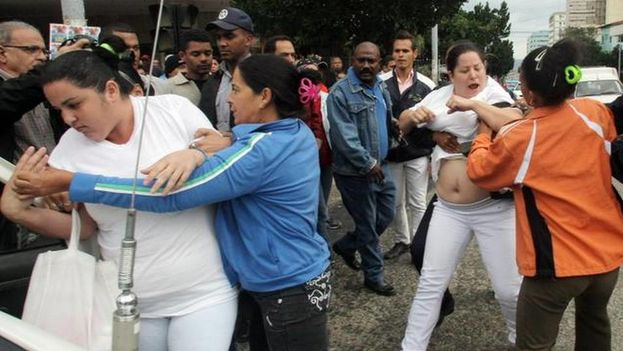
Reinaldo Escobar, Havana, 1 June 2015 – Once again the general-president, giving the impression that he invites criticism, steps on the brakes. He recognizes that it is important that everyone bring their opinions, but qualifies that it must be done “in the appropriate place, the opportune moment, and in the correct ways.”
That he has repeated it this Friday at the most recent Council of Ministers does not matter. That idea has been crushed in Parliament, the Party Congress, and at every opportunity that presents itself, while he warns in passing that he speaks of constructive criticism.
Everything indicates that by constructive criticism Raul Castro understands that which points out errors but does not discuss the theoretical basis that underlies his program, or better yet, the criticism that paves the way chosen by the criticized.
Under this logic, Karl Marx’s “Capital” is not constructive criticism, nor would be — saving the insurmountable differences –“History Will Absolve Me,” authored by his brother. However, both texts propose or suggest solutions to identified problems, which is the indispensable condition for a critical observation to merit the adjective ‘constructive.’
A critical allusion qualifies as destructive when it rages against those who do bad things, without giving them the opportunity to improve anything because they are considered unable to rectify it or have the deliberate intention to carry out evil deeds. Something very distinct from undertaking noble deeds in the incorrect way. To quote that memorable epithet that so many politicians deserve: “He did good and he did bad. The good he did badly, the bad he did well.”
When Castro mentions “the appropriate place” surely he is referring to Party meetings, directors’ councils, accountability assemblies or the pages of the newspaper Granma, where a team of censors decides what can be published.
Raul Castro understands constructive criticism to be that which points out errors but does not discuss the theoretical basis that underlies his program
They have not classified as appropriate places Fifth Avenue in Miramar, where every Sunday the Ladies and White parade and are repressed, nor the streets of Santiago de Cuba, where activists from the Patriotic Union of Cuba carry their signs of protest, much less the Plaza of the Revolution, where the artist Tanis Bruguera tried to lend a microphone to all who wanted to say something, or Central Park where the graffiti artist El Sexto wanted to drop off two tattooed pigs.
The opportune moment must be when, from the powers-that-be, a special permit is issued, as happened with those democratization assemblies in the ‘70s and in the preliminaries of the 4th Party Congress in 1994, or more recently when the population was authorized to offer opinions on the 6th Party Congress Guidelines.
The correct way is easy to imagine, initiating the action with due reverence. If we’re talking about racism, the harsh conditions of agricultural work or the mistreatment of women, we have to start by recalling everything the Revolution has done for the benefit of the injured. And if it’s about criticizing the deficiencies in education and healthcare, it is obligatory to preface it by stating that these are the jewels in the crown, free and available to all.
With critiques like these praise is not necessary.
